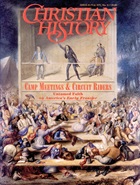Sallie Norris Hobart was worried. She and her husband, Calvin, had just moved into a raw frontier neighborhood on the Illinois prairie, and she did not see how her family was going to hold on to their religious life. There were rough and worldly families among their neighbors, and she feared her children, if deprived of religious privileges, might fall in with their drinking, dancing, gambling, and brawling.
Then came Levin Green, a Methodist preacher. He could barely read, and he murdered the King’s English, but, as Sallie’s son Chauncey remembered, “To him, God, eternity, death, the resurrection, the judgment, heaven and hell, were vivid and solemn realities. … He spoke as if these were actually present, being seen and felt by him.”
Green was the first of a series of Methodist preachers who, along with several additional religious families, helped create a flourishing religious community in the Hobarts’ neighborhood. Young Chauncey Hobart felt a close relation to all these people, and he came to expect that he too would, sooner or later, experience religion and thus “find all that these so joyfully narrated.” Sallie Hobart at age 89 was still testifying in love feasts how God answered her prayers in sending Levin Green to minister to her family’s needs.
On the frontier, the Methodists excelled in building families-in-communities. These communities were woven together by family prayer, neighborhood prayer meetings, class meetings, quarterly meetings, love feasts, and camp meetings. These rituals reinforced the faith of frontier families and, in turn, changed the nature of those families.
Families that Pray Together
Leading the family in prayer was a duty enforced upon all Methodist heads of families. It was also a ritual faithful itinerant preachers led when they visited homes.
Circuit preachers would visit the various households in their memberships and use family prayer to attend especially to the “rising generation,” as the Methodist Discipline told them to do. William Fee remembered George Washington Maley, an early Ohio circuit rider, as a particularly impressive children’s pastor. “The whole family where he visited would often be bathed in tears. He appeared to understand the character and the peculiarities of every child. He prayed for all, and we thought he prayed for everything.”
Family prayer yielded a harvest of Christian converts. David Sullins, a Tennessee preacher, recalled that the first convert from his parents’ “family altar” was his father. His mother, during one sleepless night, had told her husband, “Nathan, we can never bring up the children right without family prayers.”
“Well, … what are we to do, Becky? I can’t pray.”
Mother Sullins insisted her reluctant husband could and should pray. She induced him to do his duty by promising to take turns leading. Nathan Sullins had joined the church some time before as a “seeker on probation,” but when it came to his turn to pray in his family, it seemed like God had sought him out. “Father dropped on his knees and, stammering and choking, began. Soon, under a crushing sense of sin and helplessness, he began to confess and cry for pardoning mercy. Mother prayed and cried, and the Comforter came, and light broke in, and father was converted at family prayers.”
Thirteen children were reared around that family altar, and later, all the grandchildren and great-grandchildren “old enough to know and love Jesus” were Christians.
Times of “Profound Feeling”
Among Methodists, the “class meeting” worked hand in hand with the prayer meeting to nurture frontier faith. James B. Finley’s story illustrates how.
He was in despair over his spiritual condition when he allowed his wife to persuade him to attend a Methodist prayer meeting at a nearby home in their Kentucky neighborhood. After some songs and prayers, the leader of the meeting rose and announced their “class meeting.” All non-members were to retire, except those who had not already “enjoyed this privilege” two or three times. Finley was one of the exceptions, and he stayed to get what benefit he could.
What he experienced at the class meeting amazed him. His Presbyterian prejudices had led him to expect incoherent ranting. Instead he witnessed a customary Methodist class meeting: The leader related a part of his own Christian experience and then inquired into the spiritual states of the others present.
“I never heard more plain, simple, scriptural common sense, yet eloquent views of Christian experience in my life,” wrote Finley. “It was a time of profound and powerful feeling.” When the leader inquired into Finley’s spiritual condition, he could reply only in tears and sighs. His sorrowing speechlessness evoked much sympathy and many prayers for his salvation.
At Heaven’s Gate
The larger Methodist gatherings, which families often attended together, also supported the individual family.
Love feasts, where people shared a Communion-like meal and prayer, involved larger numbers, sometimes hundreds. Quarterly meetings, where Methodist business and preaching and prayer were mixed, were the precursors of the legendary frontier camp meetings.
These less frequent but larger gatherings were also family events. People generally came and camped as families. Furthermore, as William Fee observed, “In those days parents took their children to camp meeting, that they might be converted.” James Finley portrayed one campground covered with parents and children “clasped in each other’s arms, rejoicing together, that the ‘dead was alive and the lost found.’”
More subtle and far-reaching was the “family feeling” that such gatherings generated. Finley described his first class meeting as a time of “profound and powerful feeling.” As they met in one another’s homes and camped together, they shared Christian experience, and believers came to feel a strong bond of unity. Indiana circuit rider Allen Wiley felt that to meet as a class in “a good brother’s house” was to worship “at heaven’s gate, the next thing to heaven itself.”
Believers likened their fellowship not only to heaven, but also to family. “These little families of love,” declared Bishops Asbury and Coke, “mutually weep and rejoice, and in everything sympathize with each other, as genuine friends.”
The Methodists proclaimed that in their evangelical community one loved and was loved as a member of a family. Everybody belonged to the evangelical “family of God,” and their images of heaven and home symbolized a new fellowship that they wished to make the norm for all people.
Changing the Rules
These Methodist rituals had a profound if subtle effect on the Methodist family itself. In practice, Methodism set itself against many of the hierarchical rules that still guided the early republic. According to those traditional rules, family unity was based on the sovereignty of the husband over his wife, children, and servants—all of whom were taken to be, in some sense, his property. Evangelical experience and fellowship began shaping a different basis of family unity: mutual affection based on a common religious experience.
Early American Methodists dotted their literature with righteous, even gleeful, stories of how children defied parents, and wives defied husbands, in order to get religion. Eventually most of them converted their recalcitrant relations.
For example: One woman was converted at a camp meeting and was loudly praising God in front of the congregation when her husband seized her, dragged her to the rear of the encampment, and started to abuse her for disgracing his family. Unable to restrain him, the believers on the scene sent for local preacher James Jones, a large and capable man.
He commanded the infuriated husband to get down on his knees and pray. When the husband defied him, he wrestled the man to the ground, sat on him, and repeated his command to pray.
“I will not pray,” said the man, “if I go to hell the next moment.”
“But you must pray or you cannot arise from this place,” promised the preacher.
The preacher called on the wife and other believers to pray for the man, and, as they did, he felt the man’s resisting muscles begin to relax. The man himself began to weep and cry out to God for mercy to his soul. Soon he was converted, and then, as the witness to these events put it, “There stood that rejoicing wife and that conquered husband rejoicing and praising God together.”
The point of such stories was that God’s law and love took precedence over human legal sovereignty and ownership. In believers’ eyes, neither the preacher nor the wife conquered the husband. Rather, God’s grace gave him victory over himself. In the end, each woman, man, and child had to meet and deal with the sovereign God individually, regardless of station in life.
Thus the frontier family was reconstituted. Family unity was no longer based on hierarchical rules but upon a common experience of divine love, and upon sanctified affection one for another.
Gregory Schneider is a professor in the department of behavioral science at Pacific Union College in Angwin, California. He is author of The Way of the Cross Leads Home: The Domestication of American Methodism (Indiana, 1993).
Copyright © 1995 by the author or Christianity Today/Christian History magazine.
Click here for reprint information on Christian History.

Support Our Work
Subscribe to CT for less than $4.25/month





























